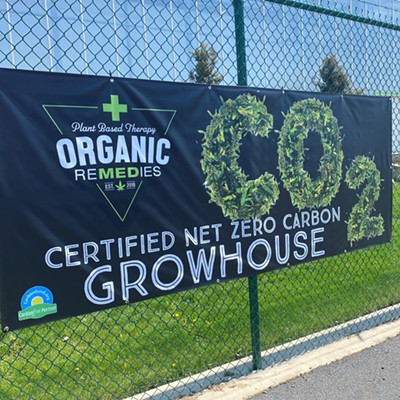Monday, September 29, 2014
P-G Columnist Continues Assault on Climate Reality
The plainer the evidence becomes that climate change is real, the louder some people deny it.
No surprise that the latest frothing attack comes from Jack Kelly, the Post-Gazette’s designated right-wing attack dog. For years, Kelly’s been denying the mountains of evidence on climate change — that’s it’s human-caused, that it’s dangerous, that it’s not hypothetical but already happening. But his column in yesterday’s Sunday Forum might be a new low.
Tellingly, the column was framed as a “fact check” of Secretary of State John Kerry’s statements on the dangers of climate change.
The problem isn’t that Kelly misrepresents Kerry’s statements (though he arguably does that, too). He also implies that any misstatements by Kerry repudiate decades of climate science.
Oh, that and the fact that the source Kelly leads with is Myron Ebell, whom Kelly identifies as “an environmental expert” from the Competitive Enterprise Institute, a long-time engine of climate denial with heavy backing from the fossil-fuel industry.
Kelly's column, headlined “Climate Craziness,” has the subhed, “Kerry spreads misinformation.” Kelly, with Gobell’s help, claims two big gotchas on the secretary. One, according to Kelly, was “The temperature of the Earth had been relatively stable ‘for literally millions of years,’ Mr. Kerry suggested.” The other was that greenhouse gases constitute “a very thin layer of gases” in the atmosphere.
Kelly goes on to note several instances — include one dated to 52 million years ago! — where the earth’s climate was different than it is today. And he quotes Ebell as saying that the quote on the “thin layers of gases sets a 'new standard’ for spreading disinformation.”
Here’s what Kerry actually said (back in February, in Indonesia):
“Try and picture a very thin layer of gases — a quarter-inch, half an inch, somewhere in that vicinity — that’s how thick it is. It’s in our atmosphere. It’s way up there at the edge of the atmosphere. And for millions of years — literally millions of years — we know that layer has acted like a thermal blanket for the planet — trapping the sun’s heat and warming the surface of the Earth to the ideal, life-sustaining temperature. Average temperature of the Earth has been about 57 degrees Fahrenheit, which keeps life going. Life itself on Earth exists because of the so-called greenhouse effect. But in modern times, as human beings have emitted gases into the air that come from all the things we do, that blanket has grown thicker and it traps more and more heat beneath it, raising the temperature of the planet.”
The “millions of years” line is fuzzily worded. But you could as easily claim that it's about carbon dioxide in the atmosphere as it is about global temperature stability.
Yet to attack Kerry over poor wording is to sidestep his larger point. We do have a long-term climate we're trying to maintain, and it is threatened by our emissions of carbon. The climate we’re trying to hold on to is the one that emerged about 10,000 years ago, after the last ice age — and with it the conditions that made agriculture and hence civilization as we know them possible, and which have remained relatively stable ever since.
Two of Kelly’s references to different global climates predate that milestone, by thousands or even millions of years. (This is classic misinformation: Cite facts that don't matter, and then claim victory.) He also references the so-called Medieval Warm Period, a phenomenon that is much debated, but which some scientists now consider it to have been a fairly localized occurrence, not one that affected the whole world, the way human-caused climate change is now doing. And in any case, it wasn't one that had anything to do with the massive emissions of greenhouse gases that are driving climate change today.
And what about the “thin layer of gases,” the statement that Kelly and Ebell think make Kerry completely unworthy of our attention? Well, Kerry’s statement on this particular matter wouldn’t pass muster in science class, it's true. (The atmosphere is several miles thick, and CO2 is widely dispersed in it.) But the fact that John Kerry can’t elegantly explain atmospheric science doesn’t cancel out the testimony of the thousands of scientists who can.
Kelly’s attacks make for a particularly egregious example of the right’s skill at framing issues not to illuminate those issues, but instead to obscure them.
Kerry’s main point, agreed upon by the authors of 97 percent of peer-reviewing scientific papers that expressed an opinion on the matter between 1991 and 2011, is that human activity is causing the climate to change.
That change, moreover, is likely to be disastrous, expressed in rising seas, stronger storms and problems with agriculture.
Kelly, by the way, takes on that oft-cited "97 percent" study, too, albeit in his typically sneaky way.
“Mr. Kerry doesn’t care about the facts. Because most scientists do, more are leaving the warmist camp, swelling the substantial ranks of the skeptics,” Kelly writes.
Wowzers! Except that Kelly cites no source for this wondrous fact about the mass retreat of climate scientists from … climate science.
He continues. “It’s no more true that 97 percent of scientists agree with Mr. Kerry than that climate has been stable ‘for literally millions of years.’” Actually, by writing “97 percent of scientists,” Kelly follows in the footsteps of other careless journalists (and, yes, politicians): The original study totted up the findings of studies, not the beliefs of scientists. And as mentioned above, nobody's really claiming that the earth’s climate has been stable for millions of years.
What about some of Kelly’s other claims?
“There’s been no warming for 18 years, according to weather satellite measurements,” he writes. Not sure where he got this one — no source is named — but NASA, for one, says global temperatures are on a long-term rising trend. True, global warming has slowed recently, but it hasn’t stopped. And the decade of the 2000s was still the hottest on record globally. (Also, be wary of the climate-denier trick, which Kelly employs, of citing low temperatures over a short time period in one country to “disprove” climate change. What counts are long-term global trends.)
Kelly also downplays concerns that Kerry has voiced about climate change’s effect on agriculture. Why? Basically because plants like carbon dioxide. That’s true — but plants also like regular rainfall and soil that isn’t washed away by giant storms. Kelly says climate change will simply mean warmer weather and longer growing seasons, but that’s another standard denier oversimplification.
Climate change isn’t simple; it’s complicated. It will mean different things in different parts of the world. In some places, perhaps including Pennsylvania, it could mean longer growing seasons. But climate change others is likely to mean drought, or more intense monsoon seasons — all things that could create millions of climate refugees, a phenomenon that’s already begun. And even in places with longer growing seasons, like Pennsylvania might have, farmers could face other problems, like more erratic rainfall.
The effects of climate change on agriculture are expected to be so far-reaching that the United Nations is focusing on helping farmers adapt. The European Union is worried as well.
But I’m guessing that Kelly passed on the day-long seminar on climate and health that those climate crazies at the Allegheny County Health Department held in May, where such issues and more were raised.
So yeah, “Climate change is as grave a threat as the Ebola virus or the terrorists of the Islamic State,” a claim Kelly attributes to Kerry only to deride it.
Kelly signs off with a shot at last week’s People’s Climate March, in New York City, mocking participants as “a motley crew of Marxists.”
Who knew the U.S. had 400,000 Marxists? Maybe they should start their own party!
But it’s not Kelly’s creaky culture-wars rhetoric that’s the problem. It’s the fact that he’s giving people bad information by doing things like misrepresenting readily accessible climate science. These are things that you’d think an editor at the Post-Gazette would catch. No wonder more Americans are unconcerned or even disbelieving about the threat posed by climate changes, which scientists tell us is truly frightening.
With so much riding on accurate reporting of climate change, Kelly’s editors (he does have editors, right?) need to be more careful.
Tags: climate change , Jack Kelly , Pittsburgh Post-Gazette , John Kerry , Myron Ebell














